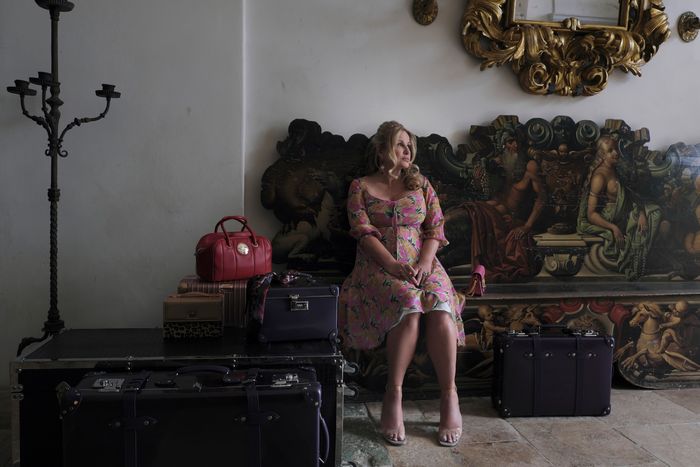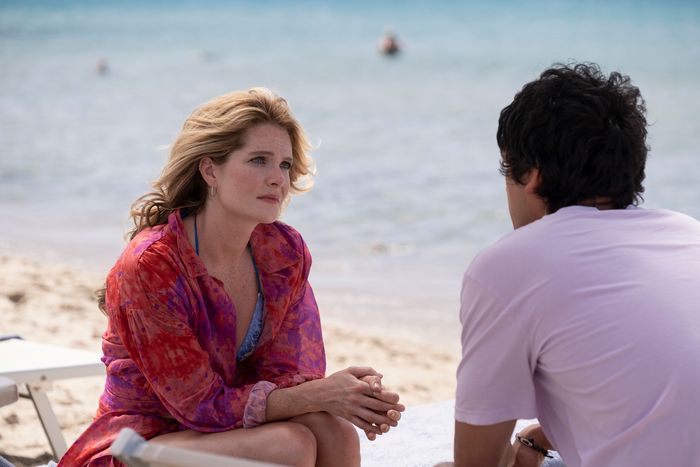
This article was featured in One Great Story, New York’s reading recommendation newsletter. Sign up here to get it nightly.
From the opening moments of this season of The White Lotus, Mike White has made us wonder: Who’s in the water? Whose body does Daphne bump into in season opener “Ciao,” and who else do the Italian police find? Is it Cam, Harper, or Ethan — members of married couples in various levels of matrimonial distress? Is it one of the Di Grasso men on a male-bonding family trip to the motherland? Sex workers Lucia and Mia or beleaguered assistant Portia?
These characters all walked to the water and gazed solemnly over it. They watched waves crashing on rocks. They heard stories about people who were killed for their seafront property, their bodies tossed off cliffs. And at the end of “Arrivederci,” it is returning White Lotus guest Tanya who is found drowned, marked for death by her frilly, pink, floral dress — so similar to the one worn by the dummy version of Michael Corleone’s first wife, Apollonia, at The Godfather tourist attraction visited by Portia. “Death is the last immersive experience I haven’t tried,” Tanya told her not-yet-husband Greg in The White Lotus season-one finale, “Departures,” and it’s with a sense of narrative self-referentiality that White transforms Tanya’s relationship with water from first-season baptism to second-season oblivion.
Water is a well-established symbol of rebirth in art and literature, and White has recurrently evoked that meaning in his own work with additional layers of fantasy and surreality. In Enlightened, he used various underwater imagery to wonder how people view themselves in the vastness of the universe — are we pearls that “hide under the sand on the ocean floor,” waiting for someone to notice us and claim us? Is the beatific serenity of a sea turtle, fully aware of and at peace with itself, possible for us? In season one of The White Lotus, the Hawaiian beach and water are places of refuge for wealthy white teenager Quinn, who sleeps on the sand and is enthralled by the seeming purity of the landscape, and for Tanya, who arrives in Hawaii to make peace with her mother’s death.
Tanya is introduced to us as self-centered and self-absorbed, actively harmful toward the White Lotus’s staff, and profoundly concerned with how she looks — especially to men. The first time she tries to scatter her mother’s ashes while on a chartered boat in “Mysterious Monkeys,” she is hysterically upset — her face frozen in a mask of agony and resentment. But in “Departures,” after all the support provided by White Lotus employee Belinda, she’s effervescent and at ease, practically dancing through the surf as she tosses handfuls of ashes into the air. She turns around, looking at the water that surrounds her, and finds a fresh start in it. The same goes for Quinn: After watching Tanya walk along the beach, he abandons his family and stays in Hawaii to canoe with a group of locals who, warmly and unquestioningly, accepted him into their crew. One of the final scenes of “Departures” is Quinn on a Hawaiian-style outrigger boat paddling far away from the shore (and his old life) and moving toward the sun and something new.
This season of The White Lotus, though, clearly and deliberately subverted that ending. Those opening-scene deaths signaled a different approach: Gone was an aquatic environment as restorative or welcoming, and in its place was the ocean as mysterious and impenetrable — not too far off from what Daphne says to Ethan about marriage in “Arrivederci.” When Daphne observes, “We never really know what goes on in people’s minds or what they do … There’s still this part that’s a mystery,” she’s talking about the ambiguity of companionship and the impossibility of ever fully anticipating what someone you love and trust might do — or do to you. Take those statements figuratively, though, and they feel a bit like commentary on the ocean: the 95 percent of it that remains uncharted and unexplored by humans, entire ecosystems in which we have no part. There are patterns and rhythms to the ocean that operate with their own intent and on which we have no impact, and White immediately establishing the water as a place of death this season amped up the unknowability of that underwater world.
Every one of these seven episodes used as B-roll waves crashing on rocks and splashing up onto cliffs, pebbles caught in undertow and sunlight dappling on the water’s surface, and sometimes even rewinding footage of the surging tide to convey a natural, unpredictable, even aggressive menace — not dissimilar from how David Lynch used trees, leaves, and winds in Twin Peaks as a reminder of all that goes on around us with no regard for our presence or our interference. In The White Lotus, there’s something comforting about our personal irrelevance in tension with other people’s choices, Daphne seems to say, because it gives us freedom to decide for ourselves how we act and react.
To take that idea of inscrutability back to Tanya, her actions this season have often felt like those of someone caught in a riptide — going with the flow until there’s no turning back and no one to save her. She’s different from a character like Daphne, who sees the storm and swims parallel to it, charting her own path through the chaos. Instead, Tanya’s end feels like both a pointed rebuke of her faux triumph at the finale of season one (frolicking along the beach and believing that water could cure her when it was really the abandoned Belinda’s constant emotional labor) and a somewhat sorrowful reminder that the answers we most seek are the ones we never find.
Tanya guesses that Quentin, “these gays,” and mob-affiliated Niccolo were planning to kill her. Why else would Jack have abducted Portia and stolen her phone? And why else would Niccolo be taking her back to shore with a bag full of rope, duct tape, and a gun? But Tanya, who shoots her way through the men, never finds out to what degree Greg, whose picture Quentin kept at his bedside, was involved in the scheme. Quentin dies as she’s questioning him. Was that fortune teller’s reading of Tanya, in which she guessed that Greg was having an affair and that Tanya would kill herself, correct? Sort of. Although misjudging the distance between two boats and hitting your head is more of an accident than a suicide.
A fair amount of all this is up for interpretation and — to White’s Daphne-voiced point — ambiguous until you make up your own mind about what you want to believe. There’s clarity, though, to White sending Tanya to a watery end and to his warning that what we believe will heal us might actually be what hurts us. The line between comedy and tragedy is a thin one, after all, and Tanya could only balance on it for so long before slipping.



